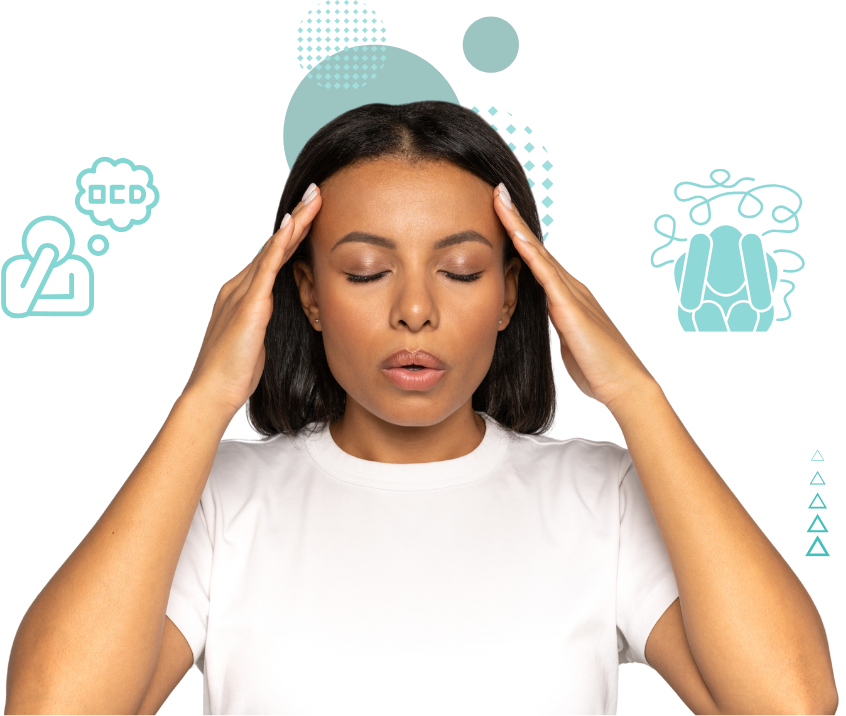Anxiety Disorder
Anxiety disorders are a group of mental health conditions that cause fear, dread and other symptoms that are out of proportion to the situation. There are several types, including generalized anxiety disorder, specific phobias and social anxiety disorder. Treatment is effective and usually includes medication and psychotherapy.
Experiencing occasional anxiety is a normal part of life. However, people with anxiety disorders frequently have intense, excessive and persistent worry and fear about everyday situations. Often, anxiety disorders involve repeated episodes of sudden feelings of intense anxiety and fear or terror that reach a peak within minutes (panic attacks).

SYMPTOMS OF ANXIETY DISORDER
Ignoring Anxiety Won’t Make It Go Away
Many people try to push through anxiety, but untreated anxiety can lead to more severe health complications. If you’ve been feeling overwhelmed, don’t wait for it to escalate.
- Feeling nervous, restless or tense
- Shortness of breath
- Having an increased heart rate
- Breathing rapidly (hyperventilation)
- Negative self talk
- Sweating
- Trembling
- Feeling weak or tired
- Trouble concentrating or thinking about anything other than the present worry
- Having trouble sleeping(insomnia)
- Experiencing gastrointestinal (GI) problems such as ulcers,nuasea and abdominal discomfort
- Having difficulty controlling worry resulting into depression
When to Seek Help
Consider speaking to a healthcare professional if:
- Your anxiety is interfering with your work, relationships, or daily responsibilities
- You often feel overwhelmed by fear, worry, or panic that’s hard to control
- You’re also experiencing symptoms of depression, or struggling with alcohol or substance use
- You suspect your anxiety may be related to an underlying physical health condition
- You’re having thoughts of self-harm or suicide — please seek immediate emergency care

The Hidden Dangers of Untreated Anxiety
Anxiety symptoms vary from person to person, but if you’ve been experiencing the following, it may be time
to seek professional evaluation.

Depression
Left unchecked, anxiety can spiral into depression, leading to deep sadness, hopelessness, and a loss of interest in activities once enjoyed. The mental exhaustion from constant worry can make it difficult to stay motivated, maintain relationships, or even complete daily tasks. Recognizing and addressing anxiety early can help prevent it from escalating into severe emotional distress.

Sleep Problems & Fatigue
When anxiety takes hold, sleep often suffers. You may struggle to fall asleep due to racing thoughts, wake up frequently during the night, or feel restless even after sleeping for hours. Over time, this sleep deprivation leads to chronic fatigue, making it harder to stay productive, manage emotions, and maintain overall health.

Sleep Problems & Fatigue
Panic attacks are one of the most distressing effects of anxiety, often coming out of nowhere with overwhelming fear, shortness of breath, dizziness, and a racing heart. These episodes can feel like a heart attack, making it difficult to function and leaving individuals fearful of when the next attack might occur. Without proper management, panic attacks can become more frequent and disruptive to daily life.
Types of Anxiety Disorders
Understanding the different forms of anxiety and when to seek help
Agoraphobia
A type of anxiety disorder in which one fears and often
avoids places or situations that might cause you to panic and make you
feel trapped, helpless or embarrassed forexample giving a public speech
or presentation in class
Anxiety disorder due to a medical condition
This includes symptoms of intense anxiety or panic that are directly caused by a physical health problem forexample being diagonised with a deadly cancer.
Generalized anxiety disorder
This includes persistent and excessive anxiety and worry about activities or events — even ordinary, routine issues. The worry is out of proportion to the actual circumstance, is difficult to
control and affects how you feel.
Panic disorder
This involves repeated episodes of sudden feelings of intense anxiety and fear or terror that reach a peak within minutes (panic attacks). You may have feelings of impending doom, shortness of breath, chest pain, or a rapid, fluttering or pounding heart (heart palpitations).
These panic attacks may lead to worrying about them happening again or avoiding situations in which they’ve occurred.
Selective mutism
This is a consistent failure of children to speak in certain
situations, such as school, even when they can speak in other situations, such as at home with close family members. This can interfere with school, work and social functioning.
Obsessive compulsive disorder(OCD)
Characterised by recurring intrinsive thoughts(obsessions) of carrying out a particular task.
Post tramautic stress disorder(PTSD)
Develops when a person has
encountered a series of unpleasant events such as a afatal ccident,loss of a dear one,abuse,natural disaster .This is characterised by symptoms of flashblacks, nightmares,and avoidance of trigers.
Substance induced anxiety disorder

Risk Factors That May Increase Anxiety
Trauma
Childhood abuse, neglect, or witnessing traumatic events increases the risk. Adults who’ve experienced trauma can also develop anxiety disorders.
Chronic Illness or Health Conditions
Stress related to serious illness or long-term treatment can heighten anxiety.
Accumulated Life Stress
Losing a loved one, work pressure, or financial struggles can trigger excessive worry.
Personality Traits
Certain traits—like perfectionism or low self-esteem—may make some more prone to anxiety.
Other Mental Health Disorders
Depression and other mental health conditions often coexist with anxiety.
Family History
Having relatives with anxiety disorders can increase your likelihood of developing one.
Substance Use
Alcohol, drugs, or withdrawal from them can worsen or trigger anxiety.
Hormonal Changes
Anxiety may occur or worsen during menstruation, pregnancy, or menopause due to hormone shifts.